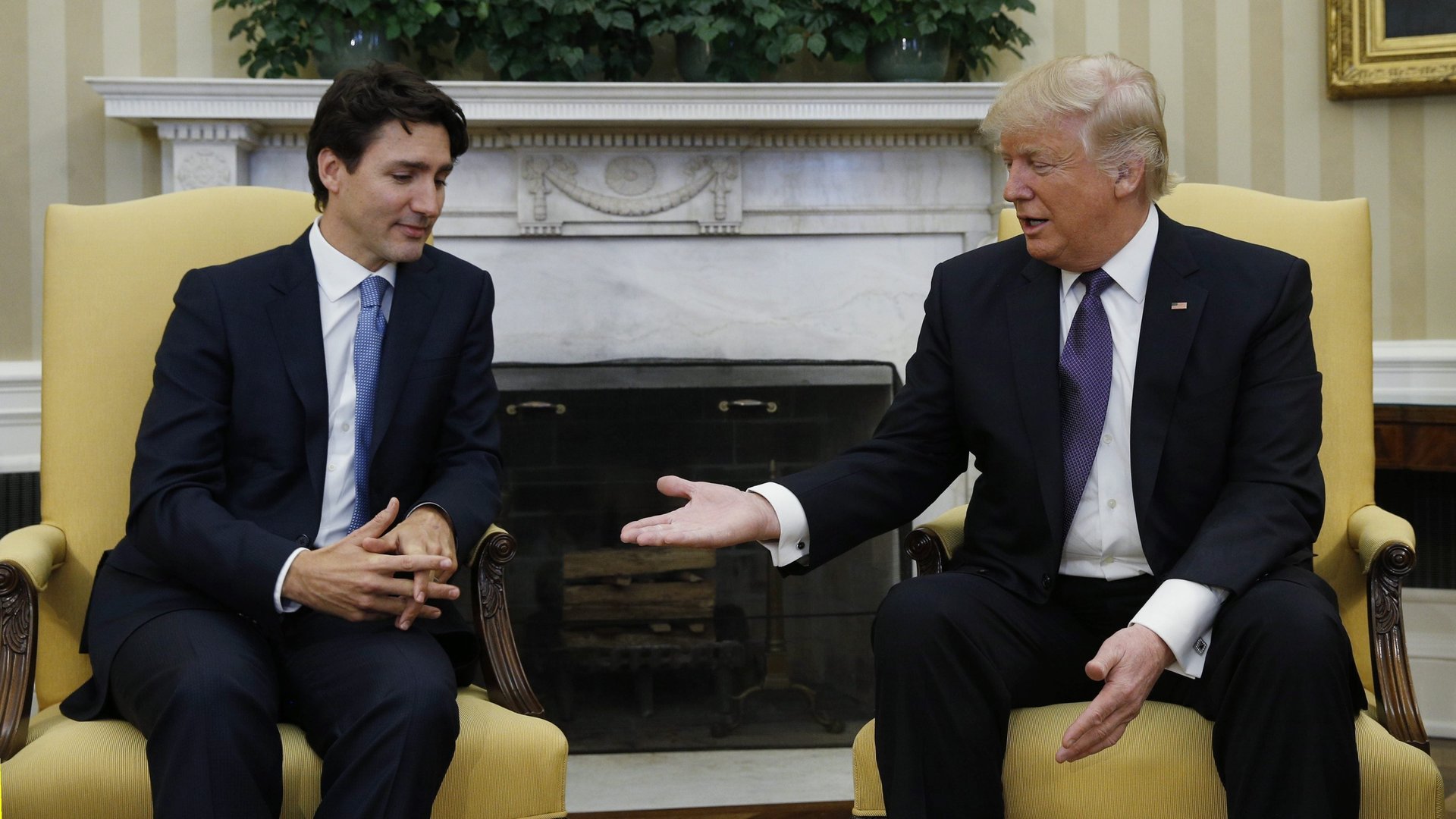A visit with Trump meant walking a diplomatic tightrope for Canada’s Justin Trudeau
For the first time since he became US president, Donald Trump met today (Feb. 13) with his Canadian counterpart, American liberal icon (and Barack Obama bro) Justin Trudeau.


For the first time since he became US president, Donald Trump met today (Feb. 13) with his Canadian counterpart, American liberal icon (and Barack Obama bro) Justin Trudeau.
Trump doesn’t see eye to eye with Trudeau on a range of issues, from social policies to refugees. When Trump issued his executive order indefinitely banning Syrian refugees and temporarily banning refugees from other countries, the Canadian prime minister tweeted a statement of Canada’s support for refugees, and promised to discuss refugee policy with the US president upon meeting him.
But when he had the opportunity, Trudeau wasn’t as forceful as some had hoped. Instead he seemed to walk a tightrope, weighing his policy disagreements with the US president against Canada’s friendship with the US. As Trudeau said during a joint press conference, in a moment of Trumpian hyperbole, “no other nations are as fundamentally linked as we are,” and perhaps to keep things as cordial as possible, the meeting between the leaders of the two countries today stuck to seemingly innocuous topics.
Upon suggestion from the Canadian prime minister’s office, Trudeau’s White House visit began with a roundtable on the empowerment of women in the workplace, attended by a group of businesswomen led by Ivanka Trump. Trudeau is an outspoken feminist, and his gender-balanced cabinet (“because it’s 2015!”) is a testament to the prime minister’s commitment to gender equality. Trump too, says he supports female representation in business, but while he may think that “nobody respects women more than I do,” his actions say otherwise: He has bragged about assaulting women, his vice president opposes reproductive rights, and his businesses aren’t especially women-friendly.
Before the roundtable began, Trump and Trudeau announced the launch of the Canada-US Council for Advancement of Women Entrepreneurs. While staying cordial, Trudeau also wasn’t needlessly ceremonious with the US president, focusing on the roundtable participants instead of the partnership. “Thank you, Donald, for welcoming us,” he said following Trump’s remarks, which included a praise of Trudeau’s work to support women. “I am really excited about launching this, sitting around the table here with a number of successful executives who just happen to be women.”
The press conference that followed the roundtable had a similar tone, with Trudeau listing out the goals shared by the two country leaders: equal opportunities for women, action against the traffic of opioids, and “an energy infrastructure program that builds jobs.” That refers, at least in part, to the proposed construction of the Keystone XL pipeline. The project, dear to Trudeau, would transport crude oil from tar sands in Canada to the US. Some of Trudeau’s energy policies are controversial among those who wish to see Canada lead the way in climate change mitigation, and the pipeline construction has long been a disputed issue due to its high environmental impact, contribution to an ongoing dependence on fossil fuels, and low economic benefit for the US. On this issue, Trump may prove a better ally to Trudeau than Obama was.
It was only when the floor opened for questions that any potentially contentious issues were raised—including what will happen with NAFTA, and differences in policy when it comes to the current Syrian refugee crises.
At first, both Trump and Trudeau did a remarkable jobs of answering these complicated questions with non-answers. For example, Trump answered a question about differences in border policies by going into campaign mode, speaking about the forgotten men and women in the US who will be forgotten no more, and the importance of “creating” borders. When the NAFTA question was raised, Trump reiterated that it was “for many, many years unfair to the United States,” and spoke about “tweaking” the agreement with Canada “to benefit both of our countries”—implying that his issues with NAFTA are really about its impact on US trade with Mexico.
Meanwhile Trudeau skirted a question about how his relationship with Trump will compare to his experience with Obama by speaking in general terms of the historically important relationship between the two countries.
However, when a journalist asked Trudeau directly about Syrian refugees—”do you believe that president Trump’s moratorium on immigration has merit on national security grounds?”—the prime minister was less vague: “The last thing Canadians would want is for me to come down and lecture another country on how they choose to govern themselves,” he said, adding “my role, our responsibility, is to continue to act in such a way that reflects the Canadians’ approach and be a positive example in the world.”
The statement falls short of Trudeau’s promise to discuss US immigration policy with Trump, but it does imply that the US isn’t a positive example—and that Trudeau does not condone the president’s actions as necessary or understandable.